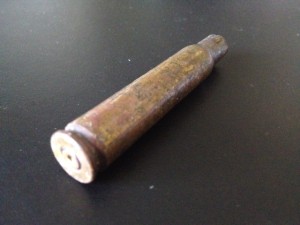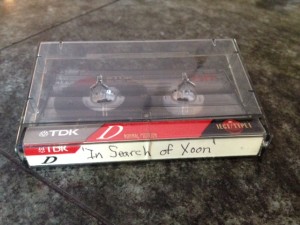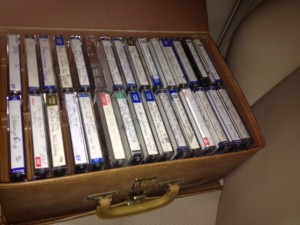(Writer’s note: if you missed Chapter 1 you can find it in our archives at the right. Our free subscription will send our blog to your email every Monday morning.)
by Bob Sparrow
 With my thumb and forefinger I fished the shell casing out from the bottom of my shirt pocket and held it in the sunlight coming through my windshield as I sped down Interstate 5 on my way home. It was the last tangible reminder of my now deceased best friend, given to me after the service by his sister. The crack of the military rifles still echoed in my ear – a resounding period at the end of his life sentence.
With my thumb and forefinger I fished the shell casing out from the bottom of my shirt pocket and held it in the sunlight coming through my windshield as I sped down Interstate 5 on my way home. It was the last tangible reminder of my now deceased best friend, given to me after the service by his sister. The crack of the military rifles still echoed in my ear – a resounding period at the end of his life sentence.
“God dammit Don, why didn’t you take better care of yourself?”
He answered, “Didn’t we always say that ‘life was too long’?”
“It was just a joke!”
“Was it?”
I drove in silence for the next three hours, although it wasn’t exactly silent, in fact my mind was filled with a thousand memories – it was actually quite noisy in there. I shouldn’t call classical music ‘noise’, but he loved the song Nessun Dorma, we listened to it together as the hair on our arms would stand on end. Now, as I drive in the vast openness of central California, that melody was haunting me as an ear worm.
Being a rather unsophisticated fan of opera, I would later learn that the song is from the opera, Turandot, by Puccini,  which ironically, or not, is about solving riddles. It features an unknown prince, a bitchy princess as well as some torture and beheadings. Pretty much like operas today, only now they’re prefaced with ‘soap’. While Nesun Dorma sounds like a beautifully majestic love song, the lyrics and the storyline in the opera are actually quite menacing. For those not familiar with the song, and even those who are and enjoy a good aria, I’ve attached a link to the 3-minute video of Pavarotti’s offering in 1994 – you may have to copy and paste it into your browser – it’s worth it!
which ironically, or not, is about solving riddles. It features an unknown prince, a bitchy princess as well as some torture and beheadings. Pretty much like operas today, only now they’re prefaced with ‘soap’. While Nesun Dorma sounds like a beautifully majestic love song, the lyrics and the storyline in the opera are actually quite menacing. For those not familiar with the song, and even those who are and enjoy a good aria, I’ve attached a link to the 3-minute video of Pavarotti’s offering in 1994 – you may have to copy and paste it into your browser – it’s worth it!
http://www.youtube.com/watch?v=rTFUM4Uh_6Y
I wondered what all this had to do with anything (as you may be wondering yourself!). The Tape was already in the car’s cassette player so I just punched ‘Play’. No longer trying to figure out what was being said, I listened more broadly to the rhythm, the pulse of it. What I heard for the first time was what clearly sounded like changes in the language being used. It was still all unintelligible, but it now seemed clear that the language being used was changing several time throughout the 90-minute tape.
I heard a number of words and phrases repeated throughout the first several minutes. One such phrase was Eviatem non Cawhoea. I’m sure the spelling here isn’t correct as I just wrote it down phonetically . . . while I was driving. Of course it meant nothing to me, but I thought about a colleague, Matt, with whom I used to teach and who now was a professor of language at nearby Chapman University, who just might be able to help.
Matt tilted his head towards the cassette player in his office, narrowed his eyes and was motionless as he listened to The Tape. As the cassette wheels spun I watched his eyes furtively shift, widen then frown. I silently pointed to the tape, as if to make him listen harder when the Eviatem non Cawhoea part was coming up for the second time. After it was spoken I clicked off the tape.
“Those words are repeated several times in the first few minutes” I told him, “Any idea what it is?”
“Maybe”, he responded as he turned to the bookshelf behind him and ran his index finger along a row of old books until he found what he was looking for. He pulled it from the shelf and gingerly laid it on his desk and turned to the page as noted in the Table of Contents.
Pointing at the page he said, “Yes, here it is right here, it is in fact . . . gibberish.”
“Oh thank you esteemed professor of language, I knew you could solve this mystery. Seriously, does any of it make any sense to you?”
“Actually some of it does. The phrase, Iviatim non Cahuilla, which is repeated several time probably refers to the Iviatim or Ivia language of an ancient Indian tribe, related to the Aztecs; they’re actually indigenous to the deserts here in Southern California. Cahuilla, (pronounced kah-wee-ah) was the name for Iviatim that was used by the missionaries and ranchero owners. It was the Spanish first, then the Mexicans that took over their land.”
“Why did they change the name? Can you translate any more of it; do you think it tells us why they changed the name?
“Hold on with the questions for a minute. I’m afraid I can’t translate anything more, that language is nearly extinct; there are probably less than 50 people in the world that can still speak it. Fortunately for you most of them are out in the Palm Springs area. Someone out there may be able to answer your questions.”
“Thanks Matt, any ideas on how I would go about finding any of the 50 people that still speak this language?”
“Well, you’re probably not going to find them sitting around the pool at the Marriott sipping a Pina Colada, but I think I can point you in the right direction.”
I would learn later that Matt actually knew exactly where to send me, and he knew why the name was changed, but he had his reasons for not being the one to give me the answers.

